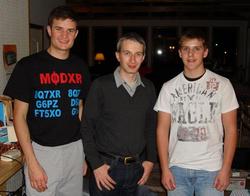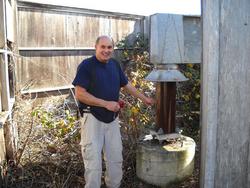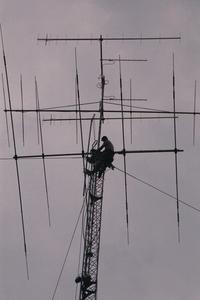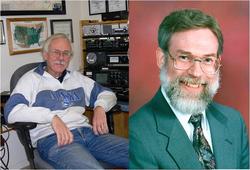 February 17, 2010 Editor: Ward Silver, NØAX | |||||
IN THIS ISSUE
NEW HF OPERATORS - THINGS TO DO If you want to add to your CW DXCC totals, there's no better contest for little pistol North American stations than the ARRL DX CW contest. Why? Unlike the everybody-works-everybody contests, DX stations must work W and VE stations - that's you! BULLETINS No bulletins in this issue. BUSTED QSOS I forgot that the original provocateur for the "how many dits in a row" puzzle was actually Barry W6YE! Runner-up provocateur, Jerry VE6CNJ, is still on the job, however, sending in this short slip of an all-dot sentence: HIS SIS SEES 5 SISSIES. Just in time to practice for those EE5 stations in this weekend's ARRL DX CW contest. CONTEST SUMMARY Complete information for all contests follows the Conversation section February 20-21
February 27-28
NEWS, PRESS RELEASES, AND GENERAL INTEREST The 2010 ARRL Field Day packet of rules and forms is now available and you can download it as a PDF package. Field Day (June 26-27, always the fourth full weekend in June) is a prime opportunity for recruiting new folks to ham radio and for educating new hams about HF contesting and operating. If your club hasn't selected a site yet, consider locating yourself in a publicly-accessible area and encourage visitors - you can add lots of points from public-exposure bonuses and from your GOTA (Get On The Air) station. The Milwaukee-area and New Jersey are both host to an FM Simplex contest this coming Sunday especially for Technician licensees and hams that haven't tried contest operation. The original contest was conceived of and run by the Milwaukee Radio Amateurs Club. Hoping to spread the fun to other areas, the New Providence ARC is hosting an event as well. Encourage your local VHF FMers to give it a try! Or have your club plan and host one! Bob N6TV writes with a demo of a new Win-Test feature. "Version 4.4 includes an "Audio Recorder" that lets you save an entire contest experience as an MP3 file. A separate free program called wtQsoPlayer enables you to convert your long Win-Test MP3 recordings into short "on demand" audio clips that anyone can access on the Web. All you need is the Web hosting space and basic text editing and file transfer skills. All of instructions and sample PHP scripts are included on the Win-Test Web site." If you worked Bob in the recent NA CW Sprint, you can hear your QSO recorded with Win-Test. "After you enter your callsign and press [ Search ], some "Listen" links will appear at the bottom. If clicking on the link doesn't play the entire MP3 file properly, right click on the link, select "Save Link As" or "Save Target As", and note where your browser has saved the MP3 file. Then double click on the downloaded file to play the QSO directly from your hard disk. The clips are +/- 30 seconds from the time I pressed [ Enter ] to log the QSO, so you may need to listen for at least 30 seconds before you'll hear yourself in the audio clip." With the CQ WW Contest receiving over 10,000 entries, the CQ WPX Contest more than 7,000 entries, and the CQ RTTY Contests with almost 5000 entries, it is becoming increasingly difficult to efficiently parse the free-form mailing addresses that appear in logs from all parts of the world. In response, last year the committee that controls the Cabrillo log format standard introduced four new tag definitions for entry of postal mailing addresses:
Some of the North Carolina counties are fairly remote, nevertheless the North Carolina QSO Party sponsors have been beating the bushes to activate as many as possible. Check out the list to see if any counties on your "Needed" list will be on the air! The increasing availability of remotely-controllable stations may lead to a careless operator violating local licensing restrictions. For example, you have to hold a valid license in the location from which you are transmitting and follow all local rules and regulations. Don't assume that you can operate from anywhere and just sign your call sign "portable wherever"! For example, CEPT license authority is only granted to "temporary visitors" and it's not at all clear that someone connecting to a station via the Internet is considered to be a visitor. Make sure you know the rules before transmitting! Steampunk, in case you hadn't encountered it before, is a combination of science fiction, fantasy, and antique technology. Aficionados of "steam radio" (a.k.a. vacuum tubes) are natural steampunks! The upcoming Nova Albion steampunk convention in California on March 12-14 incorporates elements of Maker Faire (see the next story) and other do-it-yourself activities. Maker Faires are going to be held in three US cities this year - San Mateo, CA (May 22-23), Detroit (July 31-Aug 1), and New York City (Sep 25-26). There is also an upcoming Maker Faire in Newcastle, England on Mar 13-14. The Maker Faire theme this year is the Young Makers, just like many of us when we were getting our start in ham radio. If you are part of a Detroit or NYC area radio club that might like to exhibit, ham radio has been a very popular attraction at past Faires. Contact the organizers via the Maker Faire Web site. (The San Mateo event has ham radio representation lined up!) Imagine thousands of proto-hamsters ready to learn about Amateur Radio! From the Jan 20 ARRL E-Letter, the IARU Administrative Council noted that all three regions have now reached consensus on three global Center of Activity (CoA) frequencies for use in the event of emergencies: 14.300, 18.160 and 21.360 MHz. When no emergency operations are being conducted, these frequencies are open for normal amateur usage. However, GAREC-09 calls upon IARU member-societies, among others, "whenever emergency communications are being conducted on frequencies that propagate internationally, to use any available real-time communications channels, including but not limited to e-mail bulletins, Web sites, social networking and DX-clusters to draw the attention of the largest possible number of Amateur Radio operators to on-going emergency communications, in order to avoid interference with emergency traffic." Ken KØPP discovered that the amateur radio articles that appeared in the January 2010 Linux Journal are now available on-line. You can reach them via the Linux Journal "Virtual Ham Shack: or in this online article. Web Site of the Week - Just what you were asking yourself: "Do Dogs Know Calculus?" You'll never play ball with your canine companion in the same way ever again. (Thanks, Glenn WØGJ) WORD TO THE WISE Ghost code - The random letters and characters that your brain generates from the noise and sounds your ears hear with the headphones off after spending a few hours in a big CW contest. The post-contest shower can be particularly interesting! SIGHTS AND SOUNDS The ever-evolving NR5M superstation is surveyed in this YouTube video by WØMM. The comment by Eric NM5M, "This station is Ham Radio Disneyland!" sorta sums it up. (Thanks, Larry K5OT) If you worked ED5M in the recent CQ WW 160 CW contest, you might be interested in taking a look at their station's experimental antenna and mighty nice location. (Thanks, Duncan EA5ON) Across the Atlantic here are a couple of self-described "little pistol" Canadians having fun in CQ WW160 CW as VE3CCO. (Thanks, Stan VE3TW)
Here's a very nice short video showing how the reflector and director elements of a Yagi antenna focus radio signals. The demonstration by Diane Eng (KC2UHB, I believe) uses a light bulb and handheld dipole as the receiver. This may be just the thing for teaching a new ham about Yagi antennas. There are complete construction directions on the Web page, as well, and several links to other ham radio videos. The Yagi used for the demonstration is a dual-band "Cheap Yagi" design from WA5VJB. (Thanks, Paul N5IUT) What's the "best DX"? At about 2:30 in this "cosmic zoom" video, you get an interesting perspective on just how far man's first radio signals have traveled in space. If your PC and network can handle the high-definition, full-screen mode, it's even more impressive. (Thanks, Bob N6TV) Speaking of cosmic zooms, NASA's Earth Observatory page has a nice writeup and video of a coronal mass ejection (CME) that occurred in late January as the Sun was coming back to life. RESULTS AND RECORDS The updated IARU HF Championship results have been prepared and uploaded to the ARRL's temporary contest results Web page hosted by the helpful hosts at kkn.net. Click "Initial Results" to download the PDF results writeup by K9LA. (Thanks, ARRL Contest Branch Manager, Sean KX9X) The results of the 2009 Stew Perry Contest have been published. Next year's contests will be held on Oct 23-24 (warmup contest) and on Dec 18-19, the week before Christmas. (Thanks, Tree N6TR) Preliminary results for the February CW Sprint have also been published. Congratulations to Trey N5KO on his first win in this high-performance contest! (Thanks, Tree N6TR) Management and sponsorship of the Frequency Measuring Tests have migrated to a team of amateur time and frequency metrologists led by Connie K5CM, Tom N8ZM and others. A writeup of the latest results is online and boasts of some pretty impressive measurement capability out there! The next FMT will be held on April 22 (that's the UTC date - April 21st in North America) and will be announced in QST. The winners of the 2009 PSK DeathMatch have been validated and are listed online! There is no word on the fate of any survivors of the Death Match. (Thanks, Charles W8VOM) OPERATING TIP This issue's tip is a lengthy one - a checklist, actually, by Jack WAØRJY, written for little pistols and medium guns in major contests such as this weekend's ARRL DX CW. Food for thought in the contest seasons to come. One Month prior to the contest One Week prior to the contest Two Days prior to the contest Four Hours before the contest During the contest TECHNICAL TOPICS AND INFORMATION QRZ.com reports that Lionel VE7BQH has just published his latest 2 meter Yagi performance table -- an important reference for serious VHF DX'ers. It provides key facts to help operators choose the right antenna for them. Rovers have to pack a lot of antennas to cover all the bands above 50 MHz! Tim KE3HT confronted the tradeoffs between performance and coverage and mechanical complexity with a log periodic. In this eham article he discusses his choice and how it affects his roving operation.
The February 2010 issue of Analog Dialogue has an excellent article on PIN diodes by John Ardizzoni and circuits for controlling them with an op-amp. The article includes background on PIN diodes and how they work as RF switches. There are links to additional application notes at the end of the article. The January 2010 issue of High-Frequency Electronics has a couple of nice articles of interest to high-performance hams: "Make Sub-1dB Noise Figure Measurements - Part 1: Noise Concepts" and "Magnetic Materials in Transmission Line Transformers". The latter "Design Notes" column is dedicated to recent Silent Key, Jerry Sevick W2FMI by publisher Gary K9AY. Bill W5WVO contributes the URL for a Web page that covers the history and characteristics of most of the RF connector series in use today -- in simple language and photos. Good reference stuff! Jeff K8ND implemented a system of three on-site CW Skimmers at PJ2T for the CQWW 160 CW contest and has provided a description of the system. Each of the three SDR-IQ receiver used a different directive receiving antenna switched periodically depending on the target areas of interest. The outputs of the CW Skimmers were run through K1TTT's WinTelnetX software to combine them with spots from the spotting networks and provide them directly to the Writelog contest logger's spot window. An interesting question about antenna construction came in regarding methods to drill sets of holes at right angles to each other along a tube or other round material. After looking around on the 'net and getting nowhere fast, the way I decided that I would go about it is to use a drill press and clamp the tubing to a piece angle iron. Drill one complete line of holes with one face of the angle iron clamped to the press' working surface. Keeping the tube clamped to the angle iron, rotate the angle iron so that its other face is flat against the press' working surface. Drill the remaining holes. If the faces of the angle iron make a right angle, your holes will also be at right angles. This doesn't guarantee your holes are precisely separated by ninety degrees around the pipe's circumference, however.
A bit of hang time in the dentist's office yielded this gem from Woodcraft magazine for Feb/Mar 2010. The "Tips & Tricks" column suggests using the eraser end of a wooden pencil to hold and push small work pieces through a band saw. A slip with that technique only means you have two pencils, not one less fingertip. Technical Web Site of the Week - Ferreting out articles on RFI, John NU3E came up with the following handful of technical articles from the Embedded.com Web site: "The elegance of ferrite beads as a circuit design and problem-solving component" Choosing and Using Bypass Capacitors (Part 1 of 3) Choosing and Using Bypass Capacitors (Part 2 of 3) Choosing and Using Bypass Capacitors (Part 3 of 3) We don't all necessarily need to become design engineers, but having the background information on why certain techniques work better than others and in what applications can be invaluable. CONVERSATION Backward and Forward An anonymous contributor sent in this week's Conversation piece. Perhaps you've seen the palindromic video that delivers two very different messages read in different directions. The same is true for the following text - which way of reading it do you prefer? 73, Ward NØAX Winning contest operators are all cheaters CONTESTS February 17 through March 2, 2010 An expanded, downloadable version of QST's Contest Corral in PDF format is available. Check the sponsor's Web site for information on operating time restrictions and other instructions. HF CONTESTS Semi-Automatic Key Evening--CW, from Feb 17, 1900Z to Feb 17, 2030Z. Bands (MHz): 3.5. Exchange: RST, serial, first year of bug use. Logs due: Mar 15. Rules ARRL International DX--CW, from Feb 20, 0000Z to Feb 21, 2400Z. Bands (MHz): 1.8-28. Exchange: RST, state/province or power. Logs due: Mar 22. Rules Feld-Hell Super Bowl Sprint--Digital, from Feb 20, 2000Z to Feb 20, 2200Z. Bands (MHz): 1.8-28. Frequencies: Monthly on 3rd Saturday. Exchange: RST, QTH, Feld-Hell number. Rules AM QSO Party--Phone, from Feb 20, 2300Z to Feb 21, 2300Z. Bands (MHz): 3.5-14. Exchange: RS, name, and S/P/C. Rules Russian WW PSK Contest--Digital, from Feb 26, 2100Z to Feb 27, 2100Z. Bands (MHz): 1.8-28. Exchange: RST and oblast code or serial. Logs due: 15 days. Rules CQ WW 160 Meter SSB--Phone, from Feb 26, 2200Z to Feb 28, 2200Z. Bands (MHz): 1.8. Exchange: RST and state/province or CQ zone. Logs due: Mar 31. Rules REF Contest--Phone,CW, from Feb 27, 0600Z to Feb 28, 1800Z. Bands (MHz): 3.5-28. Exchange: RS and French dept or serial. Logs due: 30 days. Rules EPC WW PSK Contest--Digital, from Feb 27, 1200Z to Feb 28, 1200Z. Bands (MHz): 3.5-28. Exchange: RST and serial. Logs due: 30 days. Rules UBA Contest--CW, from Feb 27, 1300Z to Feb 28, 1300Z. Bands (MHz): 3.5-28. Exchange: RST, serial, and ON province. Logs due: 30 days. Rules Mississippi QSO Party--Phone,CW, from Feb 27, 1500Z to Feb 28, 0300Z. Bands (MHz): 3.5-28, 50-432, Frequencies: CW 3.545,7.045,14.045,21.045, 28.045;Phone 3.857-862-867,7.238,14.275,21.375,28.375;VHF 50.13,144.22,146.55,446. Exchange: RS(T) and MS county or S/P/C. Logs due: Mar 31. Rules North American QSO Party--Digital, from Feb 27, 1800Z to Feb 28, 0600Z. Bands (MHz): 3.5-28. Exchange: Name and S/P/C. Logs due: 14 days. Rules CQC Winter QSO Party--Phone,CW, from Feb 28, 0100Z to Mar 1, 0259Z. Bands (MHz): 3.5-14. Frequencies: 3.560, 7.040, 14.060. Exchange: RS(T), S/P/C, name, CQC nr or power. Logs due: 30 days. Rules North Carolina QSO Party--Phone,CW, from Feb 28, 1700Z to Mar 1, 0300Z. Bands (MHz): 3.5-28. Frequencies: CW 3.54,3.74,7.04,7.14,14.04,21.04,21.14,28.04,28.14, Phone 3.86,7.26,14.26,21.36,28.36. Exchange: RS(T) and NC county or S/P/C. Logs due: Apr 1. Rules YL CW Party--CW, from Mar 2, 1900Z to Mar 2, 2100Z. Bands (MHz): 3.5. Exchange: RST, serial, if YL "YL," name. Logs due: Mar 31. Rules VHF+ CONTESTS FM Simplex Contest--Phone, from Feb 21, 1900Z to Feb 21, 2130Z. Bands (MHz): 50-440. Exchange: Call sign and grid square. Logs due: Mar 21. Rules WSJT Sprint--Digital, from Feb 27, see Web to Feb 27, see Web. Bands (MHz): 50,144. Exchange: NA report or NA grid. Logs due: Next Sat. Rules Mississippi QSO Party--Phone,CW, from Feb 27, 1500Z to Feb 28, 0300Z. Bands (MHz): 3.5-28, 50-432, Frequencies: CW 3.545,7.045,14.045,21.045, 28.045;Phone 3.857-862-867,7.238,14.275,21.375,28.375;VHF 50.13,144.22,146.55,446. Exchange: RS(T) and MS county or S/P/C. Logs due: Mar 31. Rules LOG DUE DATES February 17 through March 2, 2010 February 17, RSGB 80m Club Championship, Data, Email logs to: ccdata.logs@rsgbhfcc.org, , upload log at: http://www.vhfcc.org/cgi-bin/hfenter.pl, paper logs and diskettes to: (none). Rules February 19, SKCC Weekend Sprint, post log summary at: http://www.skccgroup.com/sprint/wes/wes-submit.html, paper logs and diskettes to: (none). Rules February 20, Asia-Pacific Spring Sprint, CW, Email logs to: apsprint@jsfc.org, paper logs and diskettes to: (none). Rules February 20, North American Sprint, SSB, Email logs to: (see rules, web upload preferred), , upload log at: http://www.ncjweb.com/sprintlogsubmit.php, paper logs and diskettes to: Jim Stevens, K4MA, 6609 Vardon Ct., Fuquay-Varina, NC 27526, USA. Rules February 22, 10-10 Int. Winter Contest, SSB, Email logs to: tentencontest@roadrunner.com, paper logs and diskettes to: Dan Morris, KZ3T, 131 Valencia Lane, Statesville, NC 28625, USA. Rules February 25, ARRL January VHF Sweepstakes, Email logs to: JanuaryVHF@arrl.org, paper logs and diskettes to: January VHF, ARRL, 225 Main St., Newington, CT 06111, USA. Rules February 28, SPAR Winter Field Day, Email logs to: winterfd@spar-hams.org, paper logs and diskettes to: (none). Rules February 28, Hunting Lions in the Air Contest, Email logs to: lions@vsnl.net, paper logs and diskettes to: The HLITA Contest Committee, Lions Club of Bangalore North, C/O Lion Ajoy - VU2JHM, # 9/1, Kshitija, Opp Big Bazaar, 5-Cross, Malleswaram, BANGALORE-560003, India. Rules February 28, CQ 160-Meter Contest, CW, Email logs to: 160cw@kkn.net, paper logs and diskettes to: CQ 160-Meter Contest, 25 Newbridge Road, Hicksville, NY 11801, USA. Rules February 28, Mongolian RTTY DX Contest, Email logs to: jtdxrtty@gmail.com, paper logs and diskettes to: Mongolian RTTY DX Contest, P.O. Box 830, Ulaanbaatar-24, Mongolia. Rules February 28, AGCW Straight Key Party, Email logs to: htp@agcw.de, paper logs and diskettes to: Friedrich W. Fabri, DF1OY, Hermann-Bahner-Strasse 1, D-63225 Langen, Germany. Rules March 1, New Mexico QSO Party, Email logs to: NMqsoparty@yahoo.com, paper logs and diskettes to: New Mexico QSO Party, c/o Valencia County ARA, P.O. Box 268, Peralta, NM 87042, USA. Rules March 1, BARTG RTTY Sprint, Email logs to: ska@bartg.org.uk, paper logs and diskettes to: (none). Rules March 1, AWA Linc Cundall Memorial CW Contest, Email logs to: mjmurphy45@comcast.net, paper logs and diskettes to: Mike Murphy, 38 North Reading St., Manchester, NH 03104, USA. Rules March 1, CQ WW RTTY WPX Contest, Email logs to: rtty@cqwpx.com, paper logs and diskettes to: CQ RTTY WPX Contest, 25 Newbridge Road, Suite 405, Hicksville, NY 11801, USA. Rules March 1, RSGB 1st 1.8 MHz Contest, CW, Email logs to: 1st160.logs@rsgbhfcc.org, , upload log at: http://www.rsgbcc.org/cgi-bin/hfenter.pl?Contest=1st 1.8MHz Contest&year=2010, paper logs and diskettes to: (none). Rules March 1, SARL Field Day Contest, Email logs to: hfcontests@netactive.co.za, paper logs and diskettes to: SARL Field Day Contest, PO Box 12104, Brandhof, 9324, South Africa. Rules March 2, REF Contest, CW, Email logs to: cdfcw@ref-union.org, paper logs and diskettes to: F6CTT, Cornee Fromy Joseph, Route de Coesmes, F-35240 Retiers, France. Rules March 2, UBA DX Contest, SSB, Email logs to: ubassb@uba.be, paper logs and diskettes to: UBA HF Manager, Carine Ramon, ON7LX, Bruggesteenweg 77, B-8755 Ruiselede, Belgium. Rules ACKNOWLEDGEMENTS ARRL Contest Update wishes to acknowledge information from WA7BNM's Contest Calendar and SM3CER's Contest Calendar. | |||||










